Keyword modifiers can dramatically increase your chances of getting ranked on Page #1 of Google.
In this article you’ll discover:
- What keyword modifiers are
- Why keyword modifiers make it easier to rank on Google
- How keyword modifiers are related to different stages in the buyer journey
- Why keyword modifiers bring more targeted traffic
- Different kinds of keyword modifiers
- Where to find them
- Where to use your keyword modifiers
What Are Keyword Modifiers
So, what exactly are keyword modifiers?
Keyword modifiers are words that you add to your main keyword to produce a more specific longtail keyword.
Let’s say your main keyword is ‘sunglasses’. In the long tail keyword ‘UV blocking sunglasses for men’, the keyword modifiers are:
- UV blocking
- for men
Here’s another example:
Let’s say your main keyword is SEO Tips. In the long tail keyword ‘Best SEO Tips for Fashion Bloggers’ the keyword modifiers are:
- Best
- Fashion Bloggers
Another way of putting it is that keyword modifiers are extra words that people add to their main search query in order to get more relevant results.
So instead of typing in ‘cameras,’ a searcher on Google might type in ‘best DSLR cameras under $1000’. In this query, the modifiers are:
- Best
- DSLR
- Under $1000
Keyword modifiers are adjectives, adverbs, shopping terms, and any other kind of word that will bring the searcher more specific results.
Keyword modifiers usually come at the beginning and the end of the keyword:
modifier | keyword | modifier
The modifiers change an aspect of the keyword but not its meaning.
In the following examples, the modifier is marked in bold:
- Cheap economy flights to Italy in 2018
- Best sushi restaurants in Sydney within walking distance of Darling Harbour
- Best-selling battery packs for iPhones in 2018
Keyword modifiers, also known as ‘thematic modifiers’, can be:
- General
- Niche related
- Geo specific
General keyword modifiers are words such as:
- Best
- Top
- Cheapest
Niche-related keyword modifiers are words such as:
- Tour (travel)
- Quote (insurance)
- Diet (health)
- Track (music)
- Recipe (cooking)
- Regime (fitness)
- Economy (air travel)
- RAM (computers)
Geo-specific keyword modifiers are words that specify a location:
- New York City
- France
- Europe
I said in the introduction that keyword modifiers can help you rank on Page #1 of Google. And bring you visitors who want exactly what you’re offering…
Let’s look at that in more detail:
Why Use Keyword Modifiers?
So, why should you use keyword modifiers?
Firstly, the competition for keywords without modifiers is intense, to say the least.
For example, KWFinder rates the keyword ‘camera’ as hard to rank for.
Without a domain authority of at least 45, it’s going to be next to impossible to get on Page #1 of Google for this keyword:

But throw in some modifier keywords (bestunderwater cameras under $1000), and you have a good chance of ranking on Page #1:

Let’s take ‘SEO tips’.
KWFinder doesn’t like my chances of getting on Page #1 for this term:

But add some keyword modifiers (best SEO tips for fashion bloggers) and my prospects start looking much better:

Secondly, keywords with modifiers will bring you searchers who know what they want.
Someone who goes to Google and types in ‘cameras’ is at the very beginning of the buyer journey. They are nowhere near ready to buy.
But someone who types in ‘best underwater cameras under $1000’ knows what they want. They’re not far from making a purchase.
These searchers are much further down the buyer journey (aka sales funnel). And that means they’re much more likely to ‘convert’.
So what sort of keywords indicate that someone is further down the sales funnel?
Good question!
That’s what we’ll look at in the next section…
Keyword Modifiers and The Buyer Journey
Some people call it the buyer journey, others call it the sales funnel. The point is that no one buys something straight away.
Everyone, including you, has a process they go through before buying anything.
That process usually consists of three stages:
- Awareness – becoming aware of what the options are
- Consideration – considering the options in more detail
- Decision – deciding on which options to go for
Let’s take someone who wants to buy a TV (this example is courtesy of SearchEngineLand).
At the top of the buyer journey, a TV buyer is still typing in very general search terms, such as:
- TV reviews
- Which TV is best
- Plasma or LCD
This person is still in the awareness stage.
In the middle of the funnel or buyer journey, that same person will be typing search terms that show they are thinking of buying:
- TV discounts
- TVs on sale
- Best store to buy tvs
That same person is now in the consideration stage.
At the end of the buyer journey (bottom of the funnel), the searcher is getting very specific indeed.
She’s done her research. She knows what she wants. Now she’s looking for the best place to buy it. She’s in the decision-making stage:
- Buy 70-inch plasma tv
- Where to buy {brand} + {model} tv
There are tell-tale keywords that go with each of these three stages in the buyer journey.
In their article: How To Map Content to the Buyer’s Journey, HubSpot has mapped out the keywords that go with each stage in the buyer journey.
In the Awareness stage buyers focus on Issue /opportunity type terms:
- Troubleshoot
- Issue
- Resolve
- Risks
- Upgrade
- Improve
- Optimize
In the Consideration stage buyers type in solution-type terms
- Solution
- Provider
- Service
- Supplier
- Tool
- Device
- Software
- Appliance
In the Decision stage, buyers type in comparison/review type terms:
- Compare
- Versus
- Vs.
- Comparison
- Pros and cons
- Benchmarks
- Review
- Test
Other bottom-of-the-funnel keyword modifiers are:
- Discount
- Coupon
- Promo code
- Best price
- Where to buy
- Best deals
- Ratings
- Pricing
- Prices
- Best range
- Brand names
- Geo terms (town, city, specific area)
In general, the more keyword modifiers in a search term the further along a person is in the buyer journey.
Keyword Modifiers and Search Volume
At this point, you may be wondering what the catch is.
Here it is:
Keywords with modifiers get far less monthly search volume than main keywords.
Here’s the monthly search volume for ‘cameras’:
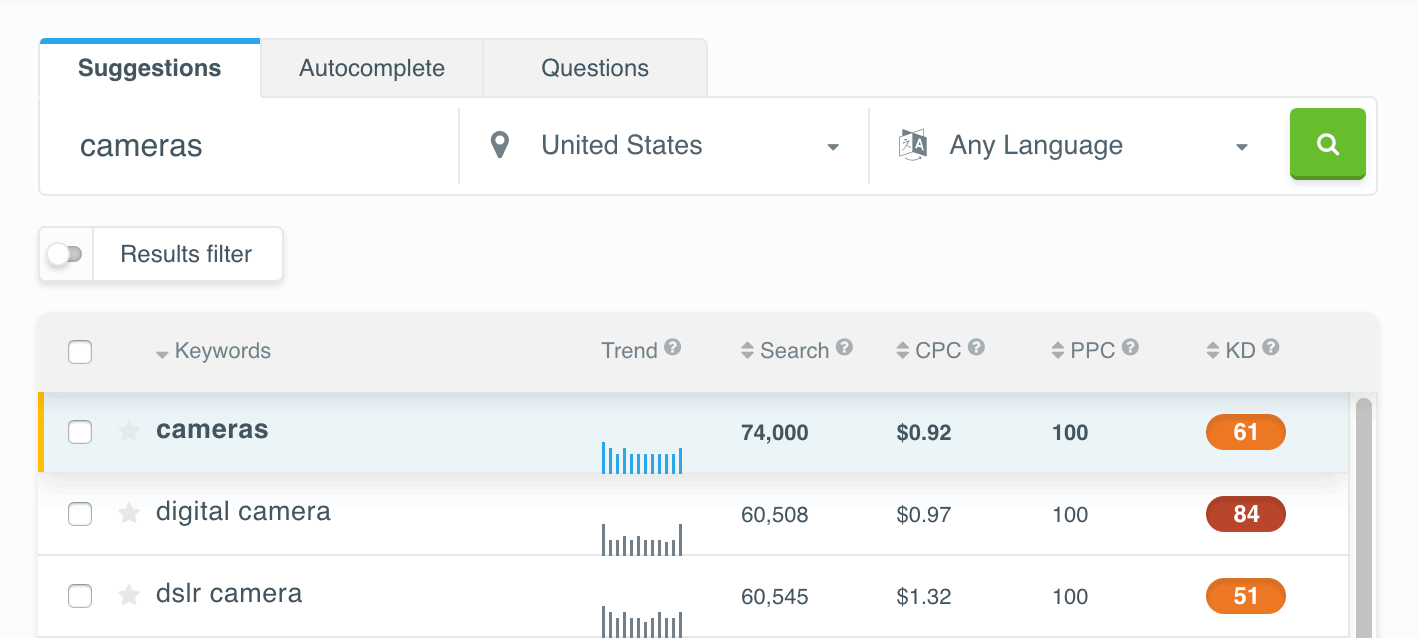
A whopping 74,000 searches per month!
And here’s the monthly search volume for ‘underwater cameras’:
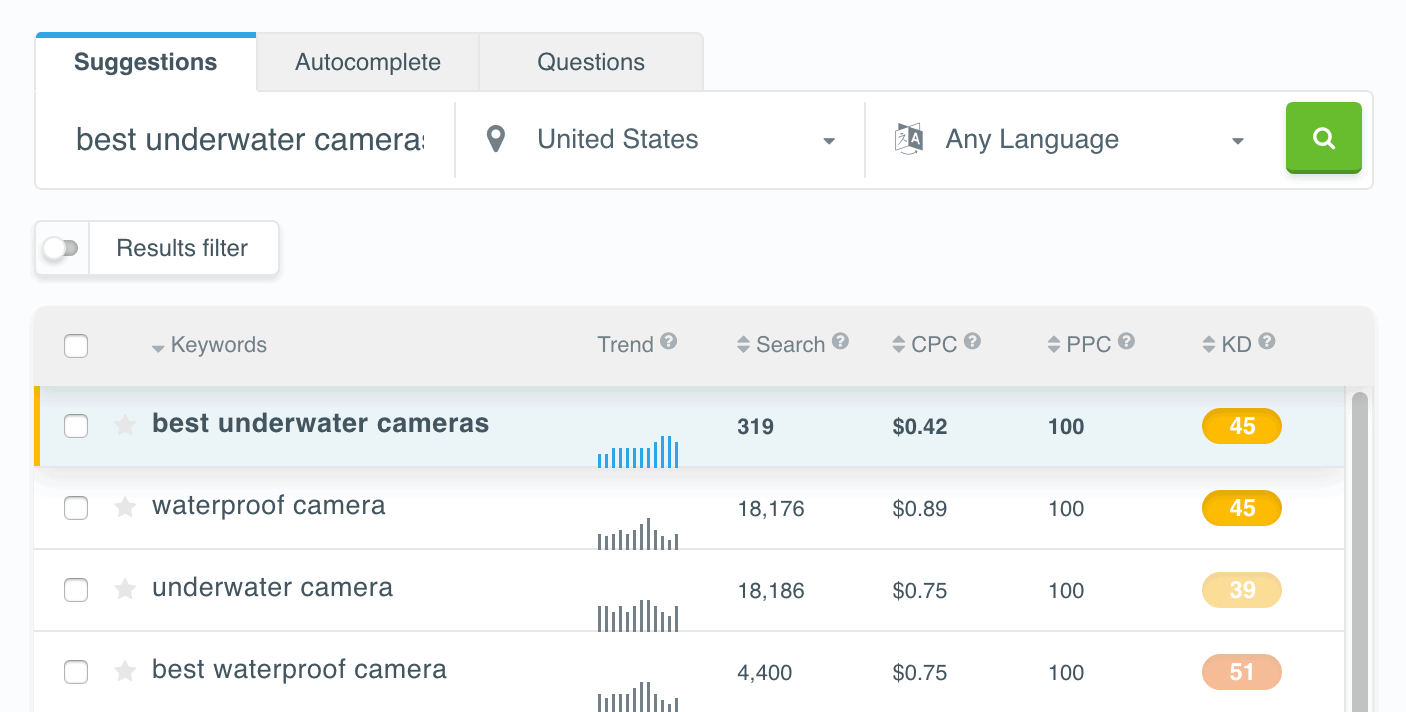
A mere 319 searchers per month!
But that’s the trade-off with keyword modifiers: less competition in exchange for less traffic.
Where to Find Keyword Modifiers
The best place to look for keyword modifiers is Google.
Start typing in your main keyword, and Google Auto Suggest will come up with related keywords containing keyword modifiers.
Here are some examples:
For the main keyword ‘photography tips’, Google Auto Suggest makes the following suggestions:
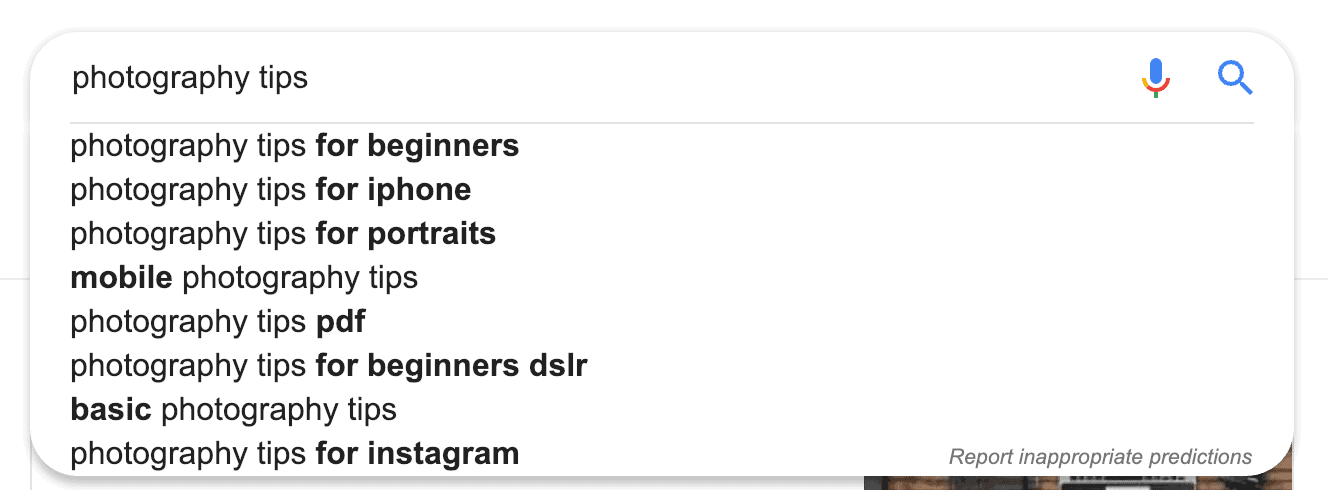
The words in bold are all keyword modifiers. Make a note of them.
Then rinse and repeat. Type in ‘photography tips for beginners’ and you’ll get some more suggestions:
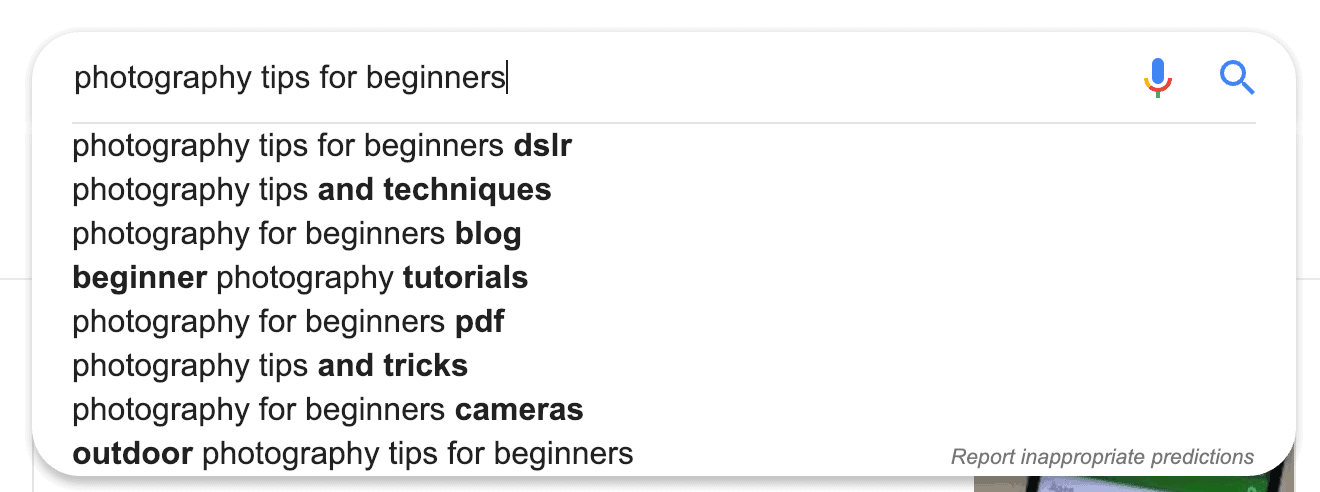
‘Outdoor photography tips for beginners’ contains two modifiers.
And that means:
- There’s going to be even less competition to get on Page #1
- The traffic is going to be even more targeted – people who type in that search term are very clear about what they want.
For the main keyword, ‘uv sunglasses’ Google suggests the following modifiers (in bold):
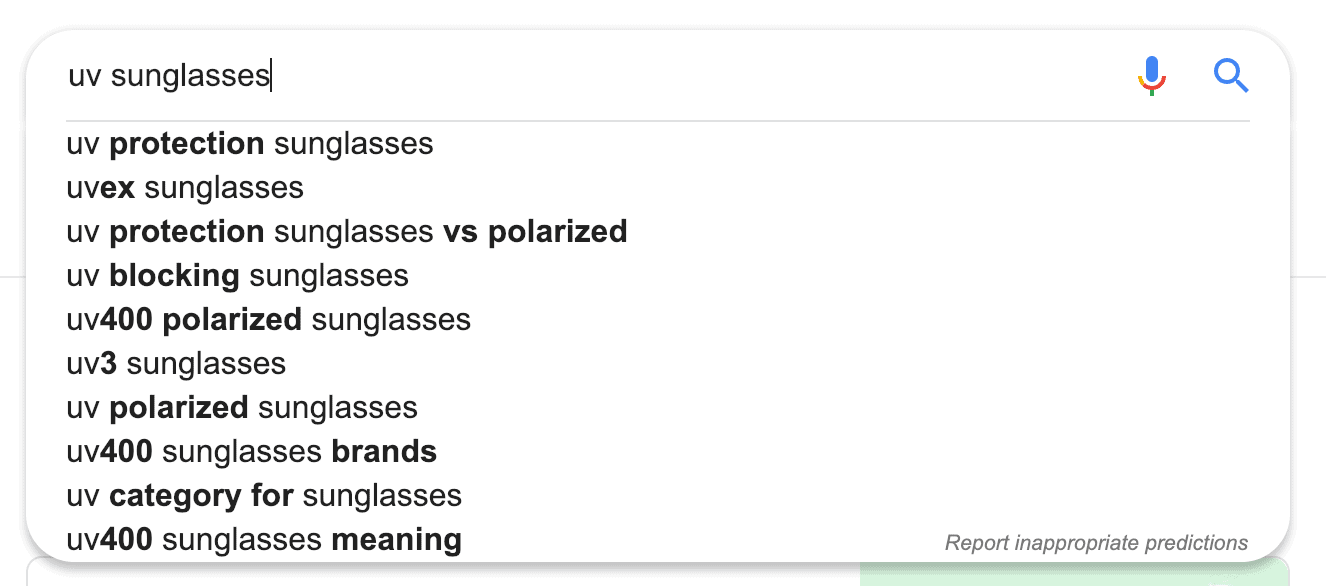
Do the same – take one of these modified keywords and put it back into Google search:
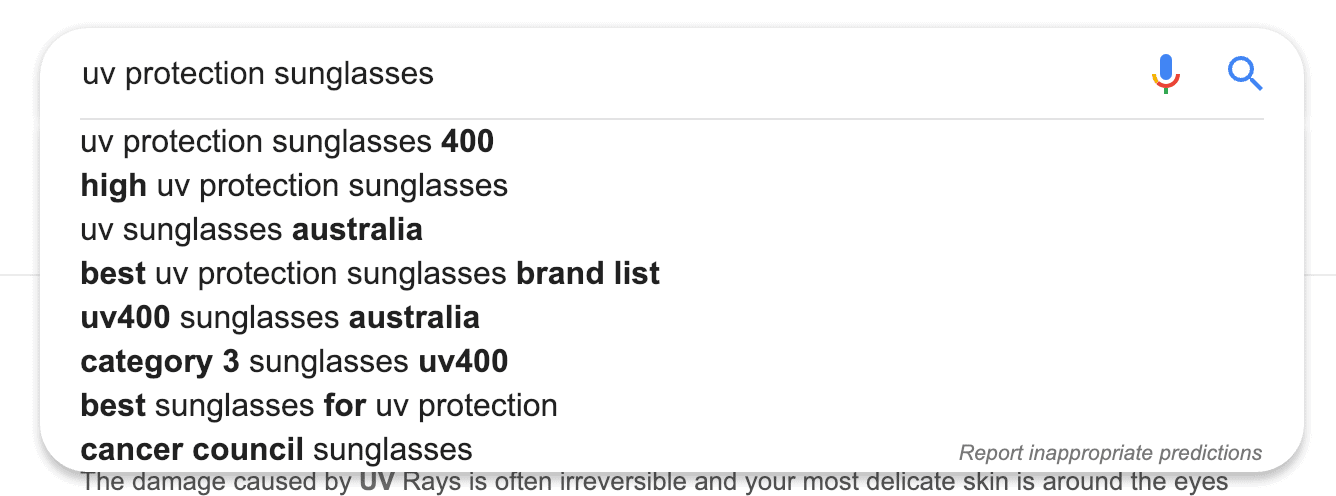
Now you’ve got a second modifier:
high uv protection sunglasses
One last example:
Type in the word ‘excel,’ and Google makes the following suggestions:
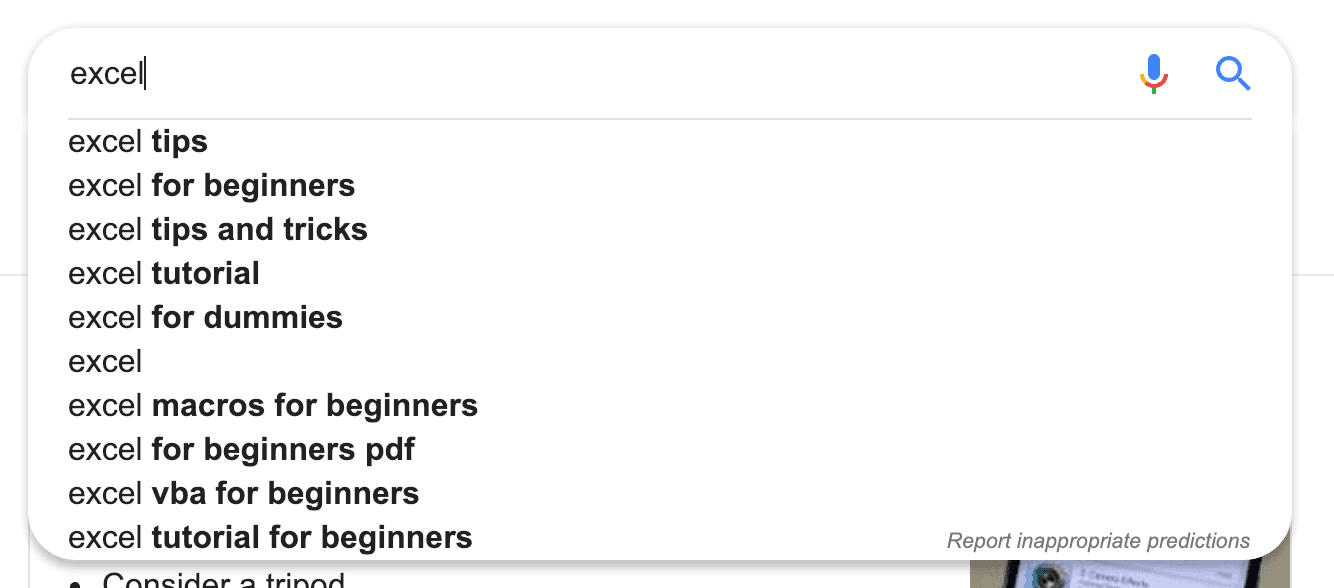
Let’s rinse and repeat, using ‘excel tips’ (our modifier keyword is in bold).
This is what we get:
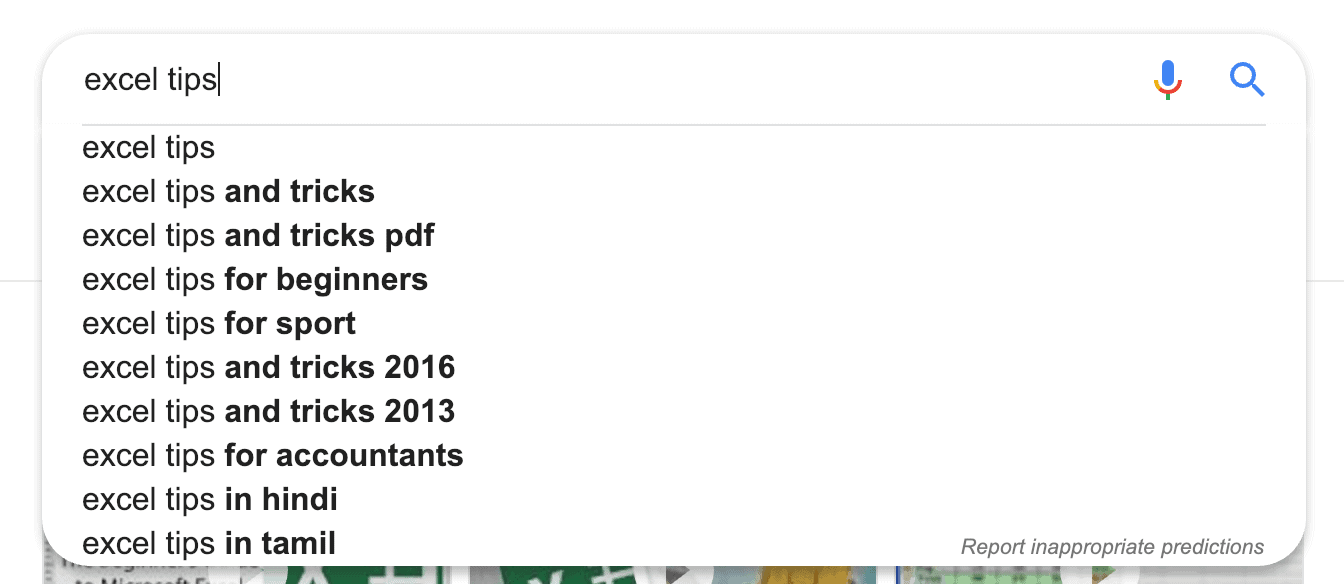
It’s going to be much easier to get on Page #1 of the search results for ‘excel tips for accountants’ (keyword modifiers in bold) than for ‘excel’ or even ‘excel tips’.
And because you know exactly what they’re looking for, you’re better able to give them what they want.
What I love about Google Auto Suggest is that these are not keywords that someone has brainstormed or conjured up. These are actual search terms that people are typing into Google.
So, you know that if you write content around those keyword modifiers, you’re going to find an audience.
By now you probably have a pretty good idea about where to find keyword modifiers and how to use them.
But let’s look at some of the different kinds of keyword modifiers.
Different Kinds of Keyword Modifiers
There are many different kinds of keyword modifiers.
Here are some the main types and how to use them:
Question keyword modifiers
According to Moz, about 8% of questions on Google are phrased as questions. So, question keyword modifiers are a good bet.
Simply replace [xxx] with your main keyword:
- Where is the best place to find [xxx]?
- How do I build or make a [xxx]?
- What is the best [xxx]?
- Where can I [xxx]?
- How to [xxx]?
- What is the easiest way to [xxx]?
- What is the fastest [xxx]?
- What is the most popular [xxx]?
- What is the best-selling [xxx]?
- What is the best ranked [xxx]?
- What is the highest voted [xxx]?
Color, size, and brand keyword modifiers
Any kind of physical product will have attributes like color, size, and brand that you can use as keyword modifiers:
- Blue, green, red etc.
- Size 8, 9, 10 (e.g. for shoes, clothing, mattresses, etc.)
- Nikon, Pentax, Canon, Fuji etc.
Example: best red iPhone covers for iPhone 8
Type of person keyword modifiers
Most products can be narrowed down by using a keyword modifier that refers to the kind of person who’ll be using it:
- Teens
- Students
- Adults
- Men
- Women
- Children
- Kids
Example: best analog watches under $100 for kids
Price range keyword modifiers
Price range is another common keyword modifier. When people shop online, they usually have a price range they’re looking at:
- Under $1000
- Under $100
- Under $10
Example: best analog watches under $100 for kids
Verb keyword modifiers
A call to action (CTA) is another type of keyword modifier:
- Buy
- Find
- Get
- List
- Compare
- Locate
Example: compare analog watches under $100 for kids
Adjective keyword modifiers
Of all keyword modifiers, adjectives are the ones that searchers use most.
And they come right at the beginning of the keyword, so they play a huge role in the search results because it’s the first word in your SEO title.
Here are some examples of popular adjectives used as keyword modifiers:
- Best
- Cool
- Cheap
- Fastest
- Affordable
- Popular
- Quickest
- Lightest
- Smallest
Example: most popular analog watches under $100 for kids
So, those are the different types of keyword modifiers.
You might be wondering how many keyword modifiers you should use. Here’s a general principle:
The more keyword modifiers you use, the narrower your target audience. And the easier it will be to rank on Page #1 of Google.
But where should you use your keyword modifiers?
That’s what we’ll look at next…
Where To Use Your Keyword Modifiers
The main place to use your keyword modifiers is in the title of your article.
Here are some examples with modifiers in bold. I took these straight from Page #1 of Google, so they’re all real article titles:
- 10 Pinterest SEO Tips That Will Set You Up for Success
- The SEO Tips That Helped Increase My Traffic 373% in 6 Weeks
- 5 SEO tips for real estate agents
- Ultimate Hand-Picked List of the Best WordPress Plugins for 2019
- 33 BestWordPress Plugins & Tools to Grow Your Business (2018)
- 25 of the Best WordPress Plugins for Marketers
- 30 Easy, Fast, & All-Day Recipes for Busy Working Moms
- 50 Unique Vacation Ideas for Couples
- 29 Of The Best Vacation Destinations For Couples
- Parenting Tips for Single Dads with Daughters
- 23 thoughtful gifts for women you can get for under $50
- 31 Money-Saving Tricks for Students
- 45 Conversation Starters To Use With Any Guy
Other places where you can place your modifier keywords are:
- In the meta title (SEO title) of your article
- In the meta description of your article
- In the headings and sub-headings of your article
- In the first 100 words of your article
- Throughout the body of your article
- In alt text of your article images
FURTHER READING
- How to Organize Your Keyword Modifiers to Create Long Tail Strategy
- How To Use Keyword Modifiers To Rank Better
- 50+ Modifiers to Boost Your SEO & Drive Sales
Conclusion
Modifier keywords are a great way to create long-tail keywords that you can rank for on Page #1 of Google.
Keyword modifiers will usually result in keywords with lower monthly search volume.
But they also target searchers who want exactly what you’re offering.
The next time you write a blog post, try adding some keyword modifiers to your main keyword. You’ll have a much better chance of ranking on the first page of Google. And the people who find your page will be the right audience for your article.
More Articles About Keyword Research
- How to Find Seed Keywords for Better SEO (2 Simple Methods)
- What Is a Focus Keyword – 7 Tips For Better SEO
- How To Find Long Tail Keywords Using Free & Paid Tools
- How To Rank for Multiple Keywords and Triple Your Traffic
- 21 Types of Keywords in SEO & How To Use Them
- What Are Stop Words In SEO – Everything You Need To Know
- High Intent Keywords – What They Are & How To Use Them
- The Keyword Golden Ratio: The Secret To Ranking on Google
- How To Use ‘People Also Ask’ (PAA) For Better SEO
- What Are LSI Keywords & How To Use Them To Rank Higher
- What Is Keyword Research – A Guide For Beginners (2022)
- What Is Keyword Grouping & How Does It Help With SEO?
Hi Rob,
A very happy new year to you!
Thank you for another detailed, well researched and very well written article – just what I expect everything I read your blog posts. I don’t know how you do but you have a way of making complex subjects very easy to understand!
You talk about the trade-off with keyword modifiers: less competition in exchange for less traffic. And I love the fact that with keyword modifiers one has a much better chance of ranking on the first page of Google plus, the people who find one’s page will be the right audience for the article. But shouldn’t one be focusing more on building up one’s domain authority so we can compete with the big boys? I say this because I currently have a DA of 24, and rank on Page #1 of Google for a couple of long tail keywords but all I get from each one is 3-4 visitors daily. To make a huge difference I would have to have hundreds of those. Just wondering what your thoughts are.
Thanks again for an awesome article. Off to share on Twitter.
Best regards,
Pedro
Hey Pedro,
Great to see you here again and thanks for your comment!
I agree with you about building up DA. Much though I’d to think that backlinks belong to another era, they still play a big role in getting on Page #1 of Google. HARO (Help A Reporter Out) is a great way to get backlinks on high domain authority websites.
Thanks again 🙂
Best regards,
Rob.
Hi Rob,
Thanks for writing such an informative article.
After reading this article, I am surprised that I have never though in this direction. I thank working on backlinking strategy and writing quality content is the key to get your page on Google’s 1st Page.
Hi Anil,
Thanks for your comment. You’re quite right about backlinks and writing quality content – two of the biggest factors in getting on Page #1 of the search results. Keyword modifiers are great for creating low competition keywords.
All the best, Rob.
Hi Rob,
Thanks for writing good contents!
Do you have any topics or are your going to write any topics that related to e-commerce site? If so, that would be very helpful because not many articles out there to teach people how to build a good e-commerce site.
All the best,
Sam
Hi Rob,
Thank you for your wonderful sharings!
I have read several of your articles and all of them are informative and open up my eyes! But I got some confusions about the content in here and the content in https://robpowellbizblog.com/how-to-use-long-tail-keywords/
If long tail keywords = seed keyword + modifier, shall we use a modifier that we THINK it’s good to our topic, or search for modifiers that really have search volumes?
Based on the above examples:
1. 5 SEO tips for real estate agents
When I type “SEO tips for r” in Google Search, it automatically suggests “SEO tips for real estate agents”. So for this title, the author used the actual search term as a long tail keyword for his article to target for the search volume. I think it makes sense and a great title.
2. Ultimate Hand-Picked List of the Best WordPress Plugins for 2019
But for this, “Hand-Picked List” and “2019” should be added just based on the author’s thought because when I enter “Ultimate h WordPress plugins”, there is no hand-pick comes out in the Google Auto Suggest. It should mean that no one searches for “hand-picked” when looking for WordPress plugins. So is it not the best choice to use this word in the title? And perhaps is it better to use a title like “ultimate guide to the best WordPress plugins” because it’s an actual search term suggested by Google?
Hi Marcus,
Thanks for your question.
In general, keyword modifiers can be divided into two kinds: (1) modifiers that narrow down the niche (e.g. ‘seo for real estate agents’ as opposed to ‘seo’ or ‘dslr cameras under $1000’ as opposed to ‘cameras’), and (2) modifiers that are adjectives and which say something about the quality of the thing referred to in the main keyword.
The second type of modifier plays a much less important role in the search phase. For example, it’s unlikely that anyone would type in ‘handpicked list of WP plugins’. They would just type in ‘list of WP plugins’ or ‘list of best WP plugins’.
But some modifiers play a key role in improving CTR in the search results.
For example, if there were two pages listed in the SERPs: one has the SEO title ‘List of Best WordPress Plugins’ while the other has the SEO title ‘Hand-Picked List of Best WordPress Plugins’, my guess is the 2nd SERP snippet will get more clicks because the word ‘Hand-Picked’ adds emotional value to the title.
But you’re quite right: the term ‘hand-picked’ won’t appear in Google Auto Suggest because it doesn’t actually define or narrow down the niche – all it does is add emotional value to the title.
In a nutshell: the modifiers that appear in Auto Suggest and Google Related Searches will in some way define or narrow down the niche. But there’s another class of modifiers that play a key role in getting clicks for the SERP results because they create excitement or add emotional value to the SEO title.
So it’s important when choosing keyword modifiers to be aware what type of modifier it is: one that actually limits or defines the main keyword (‘seo for real estate agents’ or ‘content marketing for lawyers’) or one that simply improves CTR by adding excitement/emotion to the title. Both types are important.
Hope this answers your question.
Best regards,
Rob.
Hi Sam,
Thanks for your question.
Unfortunately, e-commerce is not within my niche.
But here are some good articles on this topic:
https://www.hostgator.com/blog/get-ecommerce-website-running/
https://www.entrepreneur.com/article/284175
https://ecommerceguide.com/guides/starting-your-commerce-store/
The 3rd one looks to be a very comprehensive guide to setting up an e-commerce site.
Hope this helps,
Rob.
Thank you very much for your time and detailed reply! It’s a very helpful answer!
Thanks Marcus, you’re most welcome, Rob.